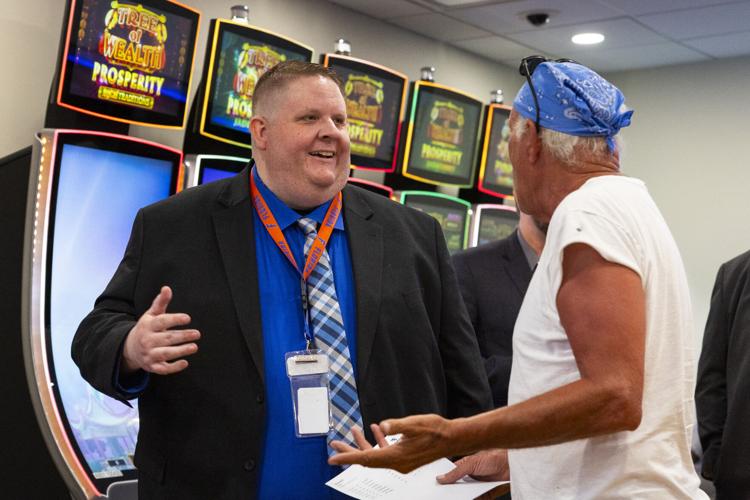
WarHorse Casino sportsbook manager Jason Johnston (left) explains the sports betting process to a customer as the first sports wagers are placed June 22.
Justin Johnston gets it. He understands that the perception of integrity is just as important as its reality.
After all, he’s lived it.
WarHorse Casino’s new sportsbook manager has blazed that trail once before by managing the launch of an Arizona sportsbook located 500 yards from a National Football League stadium.
Putting a sportsbook so near a professional sports venue — and it was done with the blessing and oversight of the Arizona Department of Gaming — is becoming more and more common.
Just about every big stadium in every state that has legalized sports betting — from Wrigley Field in Chicago to FedEx Field in Washington, D.C. — has a nearby sportsbook.
People are also reading…
The WarHorse Casino sportsbook is 8 miles from Memorial Stadium, if anyone is wondering.
WarHorse Lincoln opens to the public on Sept. 24, 2022.
And as Nebraska sets sail into what some might perceive to be the murky waters of sports gambling, Johnston understands the parameters — at least for now — like no betting on the Huskers when they’re playing in Lincoln or the inability for gamblers to place bets through mobile devices, that are currently in place.
He’s confident those issues will be sorted out with time and legislation, which many believe is inevitable — and necessary.
“Mobile gaming is probably where it’s really going to take off,” said Lance Morgan, CEO of Ho-Chunk Inc., the economic development arm of the Winnebago Tribe of Nebraska, which is running the WarHorse Casino. “You can do mobile lottery now and you can do mobile keno so I don’t know why we can’t do mobile sports betting, but that’s something to talk about next year.”
For right now, the perception of integrity — making sure everyone knows the games in play are legitimate — matters far more than the convenience of easily placing a bet.
Mobile betting apps create their own set of problems, Johnston said — one that has hit too close to home with the NFL.
Last year, it suspended Jacksonville Jaguars wide receiver Calvin Ridley, then with the Atlanta Falcons, for the entire 2022 season for betting on NFL games — “an isolated lapse in judgment,” he wrote in an apology letter to the league.
In April, three players were suspended indefinitely for betting on NFL games and two more, including wide receiver Jameson Williams, the Detroit Lions’ first-round pick last year, were suspended six games each for placing wagers on non-league games.
“It’s kind of like a dirty little secret now that mobile (betting) is so prevalent in other states,” Johnston said. “I think operators, including the mobile operators, have to step up and do a better job of knowing (the) customers.
“In some aspects, they’ve really succeeded in that, and (in) other aspects, there have been some challenges.”
Johnston cited the way BetMGM, his former employer, handled Alabama baseball coach Brad Bohannon, who was fired in early May amid a widespread investigation into suspicious betting activity on his team’s game against LSU in late April.
ESPN reported that sportsbook surveillance video at the Great American Ballpark in Cincinnati indicated that the person who placed the bets was communicating with Bohannon at the time.
“I look to what BetMGM did in Cincinnati, where they were able to facilitate an investigation,” Johnston said, pointing out that proxy betting — making a bet on behalf of someone else — is illegal in many states.
Legal sports betting in the United States has created huge revenue streams for many states. Americans have wagered more than $220 billion during the five years since the U.S. Supreme Court cleared the way for states to offer sports betting.
The instances of malfeasance are scant, and sportsbooks go out of their way to make sure the games are legitimate and without scandal, which are considered bad for business.
Lynne McNally, CEO of the Nebraska Horsemen, which is partnering with Ho-Chunk Inc., said finding the right person to run the sportsbook took a while.
“We were looking for somebody that had some vision and was willing to grow with us,” she said. “We’re a growing company and we wanted somebody that just could get into the excitement and the anticipation that Nebraskans have.
“Nebraskans really wanted to bet on sports and want a legal avenue to do it.”
But once Johnston came on their radar, she knew he was the right man for the job.
“This is his wheelhouse,” McNally said.

Lincoln sportsbook manager Jason Johnston (left) explains the sports betting process to a patron as the first sports wagers are placed Thursday.
Johnston, a central Florida native who cut his teeth on college football, moved to Las Vegas in 2015 and began working table games in the casino industry.
In 2020, he went to work for FanDuel, which is considered one of the bigger online gambling and daily fantasy sports sites out there.
Prior to that, he’d always had an interest in sports betting, but it was at FanDuel that he learned the industry.
He would move on to BetMGM and later became the sportsbook manager for its Arizona location, about a quarter mile from the Cardinals’ home stadium.
“The biggest challenge it created was there was a traffic situation,” he said. “You’ve got hundreds — tens of thousands — of fans navigating the tailgating space and our sportsbook. Our max occupancy was roughly around 500, give or take, so you were trying to keep fans in who wanted to place a bet on Sunday.
“My job was just keeping the assembly line coming in and out.”
The WarHorse operation won’t be nearly as chaotic, he said. But that doesn’t mean there won’t be gameday excitement.
“There’s nothing more exciting than watching and betting on college football,” he said. “The atmosphere is electric. Anybody that’s ever been to a game knows that type of excitement.”
How are states using tax income from legal sports betting?
How are states using tax income from legal sports betting?

Sports betting is legal and operational in 33 states as well as Washington, D.C. with three more to launch in 2023. How big is this enterprise? According to the American Gaming Association (AGA), commercial gaming revenue topped $60 billion during 2022, a 13.9% increase year-over-year. How are states using the tax revenues?
In most states, the majority of revenue heads to a "General Fund." Virginia, for instance, allocates 2.5% of its sports betting revenue to programs to combat problem gambling, and the remaining 97.5% to its General Fund. Each state is free to allocate the revenue any way they see fit, which means that some states have gotten creative in the programs and initiatives they've funded with gambling revenue.
OLBG has researched five unique programs currently being funded with gambling revenue on the state level. Initiatives range from infrastructure and water preservation to education and mental health and substance abuse programs.
Colorado
The Rocky Mountain State is known for its natural beauty and Colorado voters were moved to protect it when they went to the polls in 2019. Voters approved sports betting in November of 2019 with a major selling point being that a portion of the tax revenue would be used to fund the Colorado Water Plan. State officials predicted that sports betting would provide an average of $14.9 million per year to the water plan for the first five years, with a cap of $27.2 million a year.
The Water Plan fund makes up the largest portion of the revenue from the 10% tax on sportsbooks' net revenues. During the 2021-22 fiscal year, $12.4 million was received by the state, with $12.2 million of that approved for allocations. The Colorado Water Plan's goal is to make the state more water resilient while boosting its resources by 2050.

Illinois

Sports betting in the state of Illinois has generated nearly $190 million in tax revenue from its launch March 2020 to October 2022. Gov. J.B. Pritzker estimated that gambling could bring in more than $100 million each year with a portion of those funds being allocated to its Capital Projects Fund, which seeks to improve roads, bridges, mass transit, schools, and universities.
Senate Bill 690, which legalized sports wagering, earmarked revenues for the Rebuild Illinois Capital plan. The bill estimated that sports betting could generate approximately $58 million to $102 million annually thanks to a 15% tax on sports wagering receipts and an additional 2% tax for wagers placed in Cook County.
Montana
In June of 2019, Big Sky Country gave sports gambling the green light when former Gov. Steve Bullock signed House Bill 725 into law. This Bill gave control of sports betting to the state lottery. The state utilizes the first $12.4 million in revenue to fund its General Fund, with the excess being directed to a STEM scholarship fund.
The Montana state legislature created the program in 2015, offering $1,000 scholarships to in-state high school graduates who major in science, technology, engineering, math or health care at a Montana college. In 2020, $500,000 was added to the scholarship fund according to the Montana Lottery's Annual Report.
Tennessee

The Volunteer State has collected over $110 million in tax revenue since sports betting operators began taking wagers in November of 2020. Betting tax revenue from sports supports education in Tennessee by funding after-school programs and scholarships. Sports betting revenue is currently channeled into a lottery education fund that supports the HOPE and Tennessee Promise college scholarships.
The Tennessee Sports Wagering Act places stipulations on what the revenue could be used for in the state. The act states that 80% of the privilege tax revenue collected goes to the Lottery for Education Account, 15% goes to the general fund for infrastructure projects for local governments and 5% to the Tennessee Department of Mental Health and Substance Abuse for responsible gambling initiatives.
West Virginia
The Mountain State is looking out for its public employees. In 2018, the West Virginia state Senate passed an amendment that directed money from sports wagering to the Public Employees Insurance Agency's stabilization fund (PEIA).
The amendment passed unanimously in 2018, but it's clear that the tax revenue from sports betting hasn't been enough to put PEIA on solid ground. Rising medical costs due to inflation and the increasing costs of prescription drugs, have pushed PEIA into a $92 million deficit in 2022.
This story was produced by OLBG and reviewed and distributed by Stacker Media.














